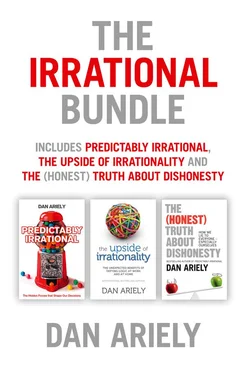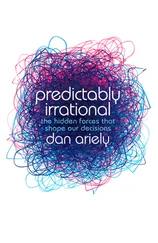Dan Ariely - The Irrational Bundle
Здесь есть возможность читать онлайн «Dan Ariely - The Irrational Bundle» — ознакомительный отрывок электронной книги совершенно бесплатно, а после прочтения отрывка купить полную версию. В некоторых случаях можно слушать аудио, скачать через торрент в формате fb2 и присутствует краткое содержание. Жанр: unrecognised, на английском языке. Описание произведения, (предисловие) а так же отзывы посетителей доступны на портале библиотеки ЛибКат.
- Название:The Irrational Bundle
- Автор:
- Жанр:
- Год:неизвестен
- ISBN:нет данных
- Рейтинг книги:3 / 5. Голосов: 1
-
Избранное:Добавить в избранное
- Отзывы:
-
Ваша оценка:
- 60
- 1
- 2
- 3
- 4
- 5
The Irrational Bundle: краткое содержание, описание и аннотация
Предлагаем к чтению аннотацию, описание, краткое содержание или предисловие (зависит от того, что написал сам автор книги «The Irrational Bundle»). Если вы не нашли необходимую информацию о книге — напишите в комментариях, мы постараемся отыскать её.
The Irrational Bundle — читать онлайн ознакомительный отрывок
Ниже представлен текст книги, разбитый по страницам. Система сохранения места последней прочитанной страницы, позволяет с удобством читать онлайн бесплатно книгу «The Irrational Bundle», без необходимости каждый раз заново искать на чём Вы остановились. Поставьте закладку, и сможете в любой момент перейти на страницу, на которой закончили чтение.
Интервал:
Закладка:
To try to answer these questions, Jiwoong Shin (a professor at Yale) and I devised a series of experiments that we hoped would capture the dilemma represented by Joe and Dana. In our case, the experiment would be based on a computer game that we hoped would eliminate some of the complexities of life and would give us a straightforward answer about whether people have a tendency to keep doors open for too long. We called it the “door game.” For a location, we chose a dark, dismal place—a cavern that even Xiang Yu’s army would have been reluctant to enter.
MIT’S EAST CAMPUS dormitory is a daunting place. It is home to the hackers, hardware enthusiasts, oddballs, and general misfits (and believe me—it takes a serious misfit to be a misfit at MIT). One hall allows loud music, wild parties, and even public nudity. Another is a magnet for engineering students, whose models of everything from bridges to roller coasters can be found everywhere. (If you ever visit this hall, press the “emergency pizza” button, and a short time later a pizza will be delivered to you.) A third hall is painted completely black. A fourth has bathrooms adorned with murals of various kinds: press the palm tree or the samba dancer, and music, piped in from the hall’s music server (all downloaded legally, of course), comes on.
One afternoon a few years ago, Kim, one of my research assistants, roamed the hallways of East Campus with a laptop tucked under her arm. At each door she asked the students whether they’d like to make some money participating in a quick experiment. When the reply was in the affirmative, Kim entered the room and found (sometimes only with difficulty) an empty spot to place the laptop.
As the program booted up, three doors appeared on the computer screen: one red, the second blue, and the third green. Kim explained that the participants could enter any of the three rooms (red, blue, or green) simply by clicking on the corresponding door. Once they were in a room, each subsequent click would earn them a certain amount of money. If a particular room offered between one cent and 10 cents, for instance, they would make something in that range each time they clicked their mouse in that room. The screen tallied their earnings as they went along.
Getting the most money out of this experiment involved finding the room with the biggest payoff and clicking in it as many times as possible. But this wasn’t trivial. Each time you moved from one room to another, you used up one click (you had a total of 100 clicks). On one hand, switching from one room to another might be a good strategy for finding the biggest payout. On the other hand, running madly from door to door (and room to room) meant that you were burning up clicks which could otherwise have made you money.
Albert, a violin player (and a resident of the Dark Lord Krotus worshippers’ hall), was one of the first participants. He was a competitive type, and determined to make more money than anyone else playing the game. For his first move, he chose the red door and entered the cube-shaped room.
Once inside, he clicked the mouse. It registered 3.5 cents. He clicked again; 4.1 cents; a third click registered one cent. After he sampled a few more of the rewards in this room, his interest shifted to the green door. He clicked the mouse eagerly and went in.
Here he was rewarded with 3.7 cents for his first click; he clicked again and received 5.8 cents; he received 6.5 cents the third time. At the bottom of the screen his earnings began to grow. The green room seemed better than the red room—but what about the blue room? He clicked to go through that last unexplored door. Three clicks fell in the range of four cents. Forget it. He hurried back to the green door (the room paying about five cents a click) and spent the remainder of his 100 clicks there, increasing his payoff. At the end, Albert inquired about his score. Kim smiled as she told him it was one of the best so far.
ALBERT HAD CONFIRMED something that we suspected about human behavior: given a simple setup and a clear goal (in this case, to make money), all of us are quite adept at pursuing the source of our satisfaction. If you were to express this experiment in terms of dating, Albert had essentially sampled one date, tried another, and even had a fling with a third. But after he had tried the rest, he went back to the best—and that’s where he stayed for the remainder of the game.
But to be frank, Albert had it pretty easy. Even while he was running around with other “dates,” the previous ones waited patiently for him to return to their arms. But suppose that the other dates, after a period of neglect, began to turn their backs on him? Suppose that his options began to close down? Would Albert let them go? Or would he try to hang on to all his options for as long as possible? In fact, would he sacrifice some of his guaranteed payoffs for the privilege of keeping these other options alive?
To find out, we changed the game. This time, any door left unvisited for 12 clicks would disappear forever.
SAM, A RESIDENT of the hackers’ hall, was our first participant in the “disappearing” condition. He chose the blue door to begin with; and after entering it, he clicked three times. His earnings began building at the bottom of the screen, but this wasn’t the only activity that caught his eye. With each additional click, the other doors diminished by one-twelfth, signifying that if not attended to, they would vanish. Eight more clicks and they would disappear forever.
Sam wasn’t about to let that happen. Swinging his cursor around, he clicked on the red door, brought it up to its full size, and clicked three times inside the red room. But now he noticed the green door—it was four clicks from disappearing. Once again, he moved his cursor, this time restoring the green door to its full size.
The green door appeared to be delivering the highest payout. So should he stay there? (Remember that each room had a range of payouts. So Sam could not be completely convinced that the green door was actually the best. The blue might have been better, or perhaps the red, or maybe neither.) With a frenzied look in his eye, Sam swung his cursor across the screen. He clicked the red door and watched the blue door continue to shrink. After a few clicks in the red, he jumped over to the blue. But by now the green was beginning to get dangerously small—and so he was back there next.
Before long, Sam was racing from one option to another, his body leaning tensely into the game. In my mind I pictured a typically harried parent, rushing kids from one activity to the next.
Is this an efficient way to live our lives—especially when another door or two is added every week? I can’t tell you the answer for certain in terms of your personal life, but in our experiments we saw clearly that running from pillar to post was not only stressful but uneconomical. In fact, in their frenzy to keep doors from shutting, our participants ended up making substantially less money (about 15 percent less) than the participants who didn’t have to deal with closing doors. The truth is that they could have made more money by picking a room—any room—and merely staying there for the whole experiment! (Think about that in terms of your life or career.)
When Jiwoong and I tilted the experiments against keeping options open, the results were still the same. For instance, we made each click opening a door cost three cents, so that the cost was not just the loss of a click (an opportunity cost) but also a direct financial loss. There was no difference in response from our participants. They still had the same irrational excitement about keeping their options open.
Then we told the participants the exact monetary outcomes they could expect from each room. The results were still the same. They still could not stand to see a door close. Also, we allowed some participants to experience hundreds of practice trials before the actual experiment. Certainly, we thought, they would see the wisdom of not pursuing the closing doors. But we were wrong. Once they saw their options shrinking, our MIT students—supposedly among the best and brightest of young people—could not stay focused. Pecking like barnyard hens at every door, they sought to make more money, and ended up making far less.
Читать дальшеИнтервал:
Закладка:
Похожие книги на «The Irrational Bundle»
Представляем Вашему вниманию похожие книги на «The Irrational Bundle» списком для выбора. Мы отобрали схожую по названию и смыслу литературу в надежде предоставить читателям больше вариантов отыскать новые, интересные, ещё непрочитанные произведения.
Обсуждение, отзывы о книге «The Irrational Bundle» и просто собственные мнения читателей. Оставьте ваши комментарии, напишите, что Вы думаете о произведении, его смысле или главных героях. Укажите что конкретно понравилось, а что нет, и почему Вы так считаете.












